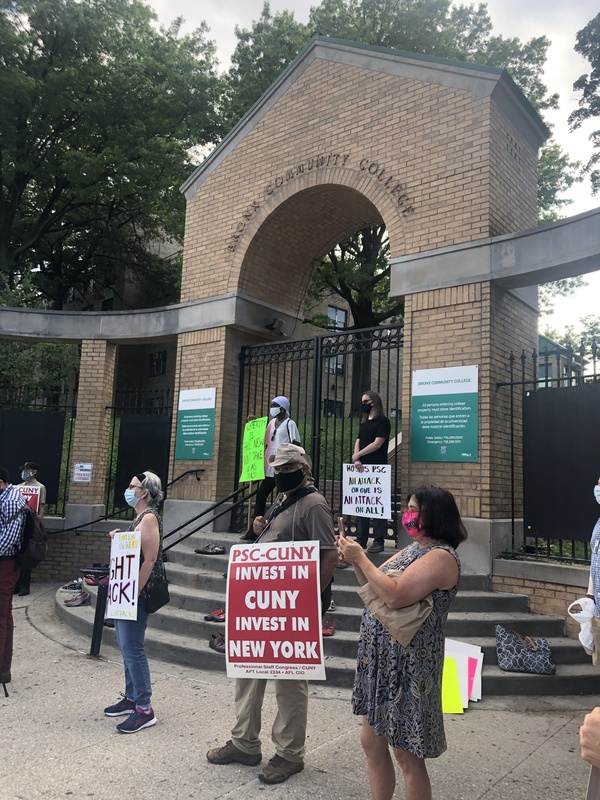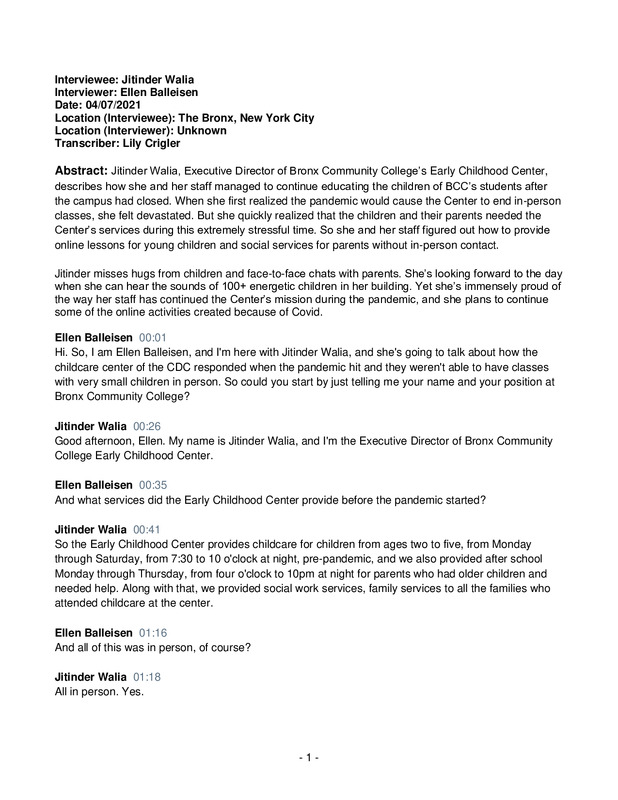Items
Tag
teacher
-
 2020-07-15
2020-07-15PSC-CUNY Protest at BCC
For my primary source, I selected a photograph I took at a protest held in front of the Bronx Community College campus on July 15, 2021. The Professional Staff Union of CUNY (PSC-CUNY), the union for the faculty and much of the staff throughout CUNY, organized the event to protest the BCC administration June 26 decision to lay off 36 experienced adjunct professors at the end of their 3-year contracts, even though that their departments recommended that they be rehired. People in the picture include BCC Faculty, staff, and students, as well as those from as well as people from Hostos Community College, who came to support the BCC community and were facing similar cuts. The day was very hot, but I was nervous to the subway because of COVID, so I rode my bike from my home (about 24 miles roundtrip). I was pretty sweaty and probably stinky when I arrived. It was the first time I had been to campus since March 10, when, on my way home from school on the subway, I learned CUNY was moving online. (The campus itself was locked, but we stood in front of the gate on University.) It was also the first time I people from school in person since March; I was so happy to talk to them. It was weird to be with a group people, after months of isolation, but we all wore masks and stood six feet apart. Cars honked their support as they drove by. I selected this source because I want historians of the future to understand how the pandemic hit higher education and the connections among the COVID crisis, social justice movements, and education. Although I went to larger marches after the murder of George Floyd, I believe funding for CUNY is a form of social justice. I was angry that politicians and school administrators were giving lip-service to the phrase Black Live Manners, while cutting funding and jobs from CUNY. BCC’s students are overwhelmingly Black and Latinx, and many studies show that a CUNY education is one of the best schools for supporting social mobility, helping people support themselves and their families. Firing the adjuncts not only meant the teachers lost their income, and, sometimes, their health insurance, but that BCC students would be in larger classes; larger classes mean faculty have less time to devote to each student, which can make it harder to for students to succeed. While I understood enrollment was down and the budget from the city and state would likely be smaller because of the economic toll of the pandemic, I thought there were other places the administration could cut costs. (Such as their own salaries). I want historians to see that the faculty and staff of CUNY fought for what their students deserved and the connections among CUNY, social justice, and New York’s economic recovery. I also want them to see how people approached protests, which require gathering together with other people and often chanting or shouting, while in the middle of a pandemic that required people to stay apart and cover their mouths. -
 04/07/2021
04/07/2021Jitinder Walia Oral History, 2021/04/07
Jitinder Walia, Executive Director of Bronx Community College’s Early Childhood Center, describes how she and her staff managed to continue educating the children of BCC’s students after the campus had closed. When she first realized the pandemic would cause the Center to end in-person classes, she felt devastated. But she quickly realized that the children and their parents needed the Center’s services during this extremely stressful time. So she and her staff figured out how to provide online lessons for young children and social services for parents without in-person contact. Jitinder misses hugs from children and face-to-face chats with parents. She’s looking forward to the day when she can hear the sounds of 100+ energetic children in her building. Yet she’s immensely proud of the way her staff has continued the Center’s mission during the pandemic, and she plans to continue some of the online activities created because of Covid.
